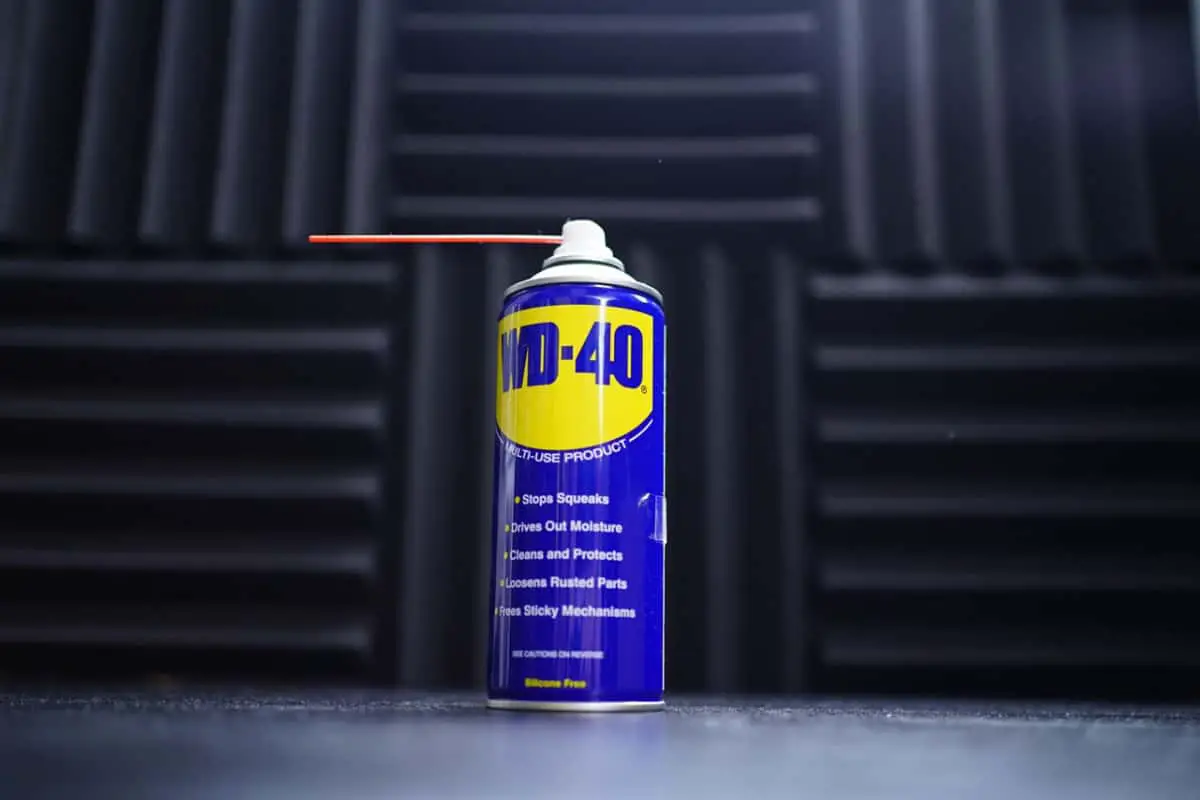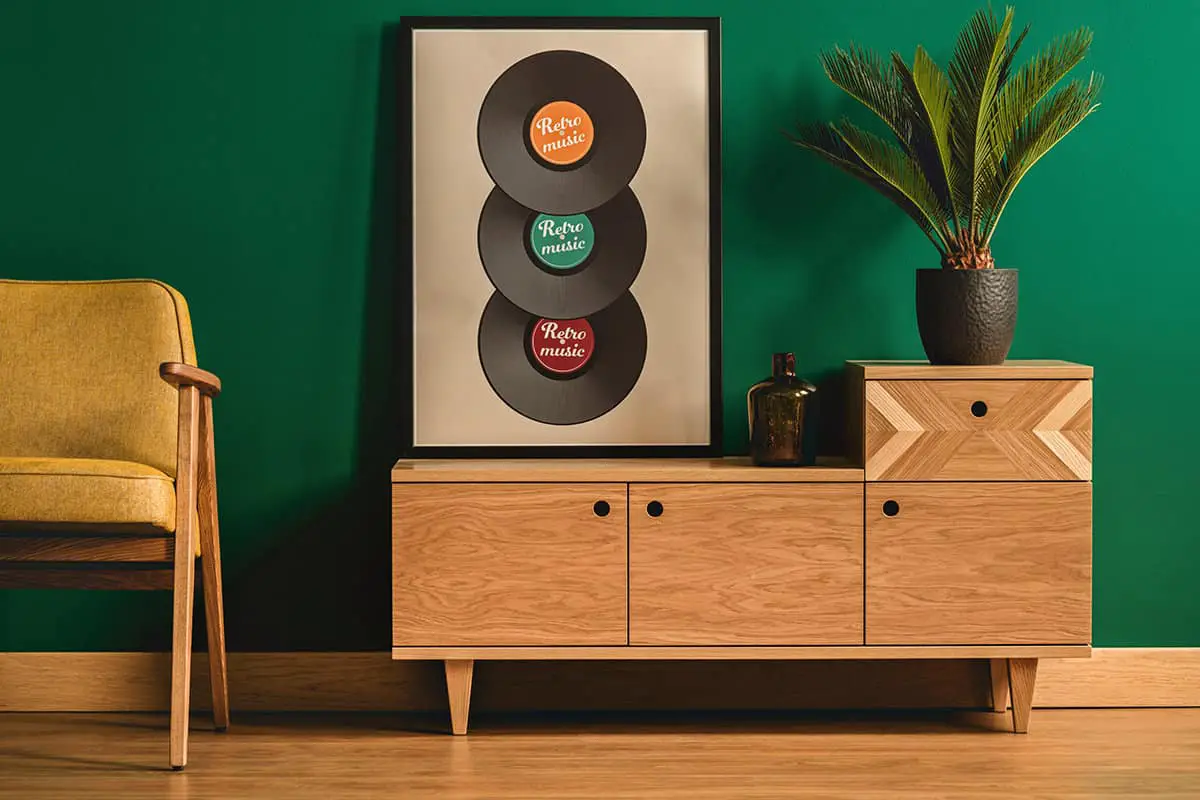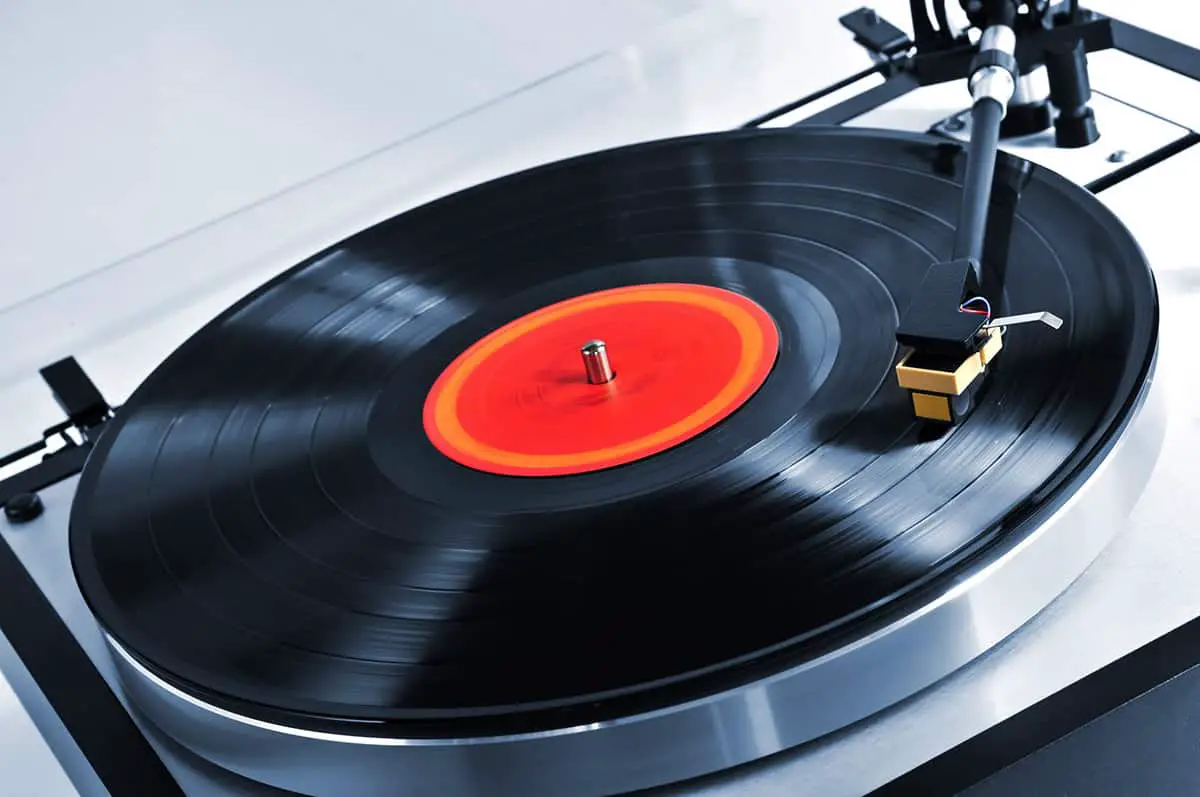This post contains affiliate links.
If you hear scratching on your vinyl record while playing, that’s not a scratch on your vinyl record; that’s dirt. Here’s how you can use WD-40 to clean your vinyl record safely and efficiently.
For audiophiles out there that want a fast and reliable method of cleaning your vinyl record, you’re in the right place. Here’s how you use WD-40:
1.Spray the WD-40 on a lint-free cloth
2.Thoroughly clean the vinyl record with the sprayed cloth
3.Let it sit and dry for a couple of 3-4 minutes.
4.You’re done!
This article will go on to give you an in-depth explanation of this process. Not only that, but it will also provide additional information on cleaning vinyl records. Keep reading for more information on the maintenance and care of your vinyl records.
Table of Contents
Here’s How To Properly Use WD-40 To Clean Vinyl Records
First things first, what is WD-40?
WD-40 is a type of petroleum solvent. It is volatile and evaporates to leave behind a lubricant that is non-volatile. Volatile refers to a substance that quickly evaporates even when exposed to average temperatures.
The volatility of WD-40 is one of the reasons that make this product a great vinyl record cleaning alternative.
So how do you use it to clean your vinyl records? Here’s how it starts.
1. It All Starts With A Clean Record
Before you can play a vinyl record, you have to clean it first. After playing it, you have to clean it again. Hence the reason for the first step, it all starts with a clean record.
Vinyl records tend to gather dust, dirt, and any other unwanted matter on their surfaces. When playing the vinyl record or storing the vinyl record, exposure to unwanted contaminants occurs.
It’s good practice to clean your vinyl records after every use, hence why this step is first on the list. It’s good to start on a clean record.
There are two types of cleaning methods for vinyl records:
- Wet Cleaning
- Dry Cleaning
Wet cleaning refers to the cleaning process of using a fluid and a brush or a record cleaning machine. In comparison, dry cleaning involves the use of a dry brush.
WD-40 uses the wet cleaning process, and instead of a brush, it uses a lint-free cloth. The wet cleaning process has three other cleaning processes:
- one step cleaning process
- two-step cleaning process
- three steps cleaning process
The one-step cleaning process involves using one cleaner to clean the vinyl record, while the two-step cleaning process involves using two steps to clean the vinyl record. The three-step cleaning process follows the same pattern.
Since you are using one product, the WD-40, it is safe to say that you will be using the one-step cleaning process. Let’s get to it.
2. Place The Record On A Flat Surface
Record collectors prefer to place the vinyl record on top of a turntable mat with a towel or an absorbent cloth underneath it. You want a working surface that will not damage the record at all costs.
It’s unnecessary to have a turntable mat but make sure your record is sitting safe, pretty, and ready for a cleaning session.
3. Spray The WD-40 Onto A Lint-free Cloth.
You want to make sure that whatever touches the record will not damage it as well. Lint-free cloth won’t leave any unwanted strands of cloth behind, and it’s a safe material when cleaning vinyl records.
In my experience, lint-free cloth is a great tool when using the WD-40.
4. Spread The WD-40 Carefully Onto The Surface Of The Record.
Start cleaning the WD-40 on the lint-free cloth onto the surface. Be gentle and be sure to clean both sides of the vinyl record. You want to make sure that you spread the product evenly on the surface and the vinyl record is free of unnecessary damage.
Would you please not put your back into it? It needs some good cleaning but not enough force to split it in half or crack it.
5. Let It Sit For 3-4 Minutes
Remember that WD-40 is a volatile solvent. It evaporates and leaves behind a non-volatile lubricant. It doesn’t need to be left under the sun for it to dry.
Leave it on the flat surface you’ve been working on, and after 3-4 minutes, you can check on your vinyl record.
6. You’re Done!
You can now safely store or play your vinyl record with complete confidence that your vinyl record is clean and working efficiently.
What Does WD-40 Offer To My Vinyl Records?
WD-40 offers two things after use:
- Dirt removal
- Lubrication
WD-40 removes any dust, dirt, grime, or unwanted substances that were on the surface of your vinyl record. It also lubricates your vinyl records. Vinyl record owners reported smoother revolutions playback improvement.
Some users may deem it controversial, but WD-40 does the job. Moreover, it does not have any substances that may affect vinyl or PVC (polyvinyl chloride – the primary substance that vinyl consists of).
Vinyl erodes in the face of ammonia and alcohol. WD-40 contains none of the decaying substances. It cleans and protects vinyl before and after use.
Furthermore, the WD-40 formula has stayed the same since 1953. The formula remains a trade secret, but users can see its constituents. It’s safe to say that WD-40 is a consistent product that will probably not change its formula in the future, and it makes for a tremendous vinyl cleaning tool.
Disclaimer On The Different Types Of WD-40
WD-40 comes in numerous types of cans. It’s a multi-use product, so it’s not shocking that it has specialized product versions. Experts recommend using the blue can version of WD-40 for cleaning vinyl records.
Are You A Vinyl Record Owner? Here Are Some Helpful Faqs To Help You Maintain And Clean Your Vinyl Records With WD-40.
- Is It Okay To Clean Vinyl Records With WD-40?
Yes, it is. WD-40 is a great vinyl record cleaning product. It does not contain any ammonia or alcohol, and it is a volatile solvent. After use, it will remove the dirt or dust, evaporate and leave behind a non-volatile lubricant.
Users have reported that it increases playback improvement. WD-40 is an excellent alternative to vinyl record cleaning products. All you require is a lint-free cloth, the WD-40, and time.
The entire cleaning process is fast, easy, and efficient. As long as you do it correctly and the vinyl record does not suffer from damage during cleaning, all is well.
- What Is The Best Way To Clean Vinyl Records?
The wet cleaning method is the best method to clean vinyl records. Its because the wet cleaning method applies to both new, used or old vinyl records.
If you’ve bought used or old vinyl records, then the wet cleaning method is ideal. It will help jumpstart the maintenance process, and you will have a much easier time cleaning the vinyl records in the future.
The industry has numerous cleaning products to choose from if you’re in the market for one. However, if you’re looking for an alternative answer, the WD-40 is a great choice. Not only does it remove dirt or grime, but it also lubricates the vinyl record.
- Does WD-40 Ruin Plastic?
No, WD-40 does not ruin the plastic. Vinyl consists of PVC or polyvinyl chloride.
PVC suffers damage from consistent exposure to ammonia or alcohol. WD-40 does not contain ammonia or alcohol in its formula.
For this reason, it’s one of the best alternative vinyl record cleaners. So if you’re in the market for a vinyl record cleaner, in my experience, WD-40 is a great choice.
Related Articles:
- Why You Should Never Use Windex To Clean Vinyl Records
- Is Vinegar a Good Way to Clean Vinyl Records?
- A Step By Step Guide To Cleaning Vinyl Records With Microfiber
- A Complete Guide To Properly Cleaning Your Vinyl Records
Sources
1.Jenna Miles, The Beginner’s Guide to Vinyl Records: How to Build, Maintain and Experience a Music Collection in Analogue (Massachusetts: Adams Media,2017) 256.
2.Mike Saurus, Unusual uses for WD-40, Instructables Workshop, https://www.instructables.com/Unusual-Uses-for-WD-40/ Accessed July 20th, 2021.
3.Wikipedia, WD-40, Wikipedia, https://en.wikipedia.org/wiki/WD-40 Accessed July 20th, 2021.
4.AZO Materials, An Introduction to Vinyl, AZO Materials, https://www.azom.com/article.aspx?ArticleID=987 Accessed July 20th, 2021.
VacationVinyl.com is a participant in the Amazon Services LLC Associates Program, an affiliate advertising program designed to provide a means for sites to earn advertising fees by advertising and linking to Amazon.com. We also participate in other affiliate programs which compensate us for referring traffic.


![WD-40 - 490224 Multi-Use Product with SMART STRAW SPRAYS 2 WAYS, 14.4 OZ [2-Pack] WD-40 - 490224 Multi-Use Product with SMART STRAW SPRAYS 2 WAYS, 14.4 OZ [2-Pack]](https://m.media-amazon.com/images/I/51zKbE6lzrL._SL500_.jpg)
![WD-40 - 490224 Multi-Use Product with SMART STRAW SPRAYS 2 WAYS, 14.4 OZ [2-Pack] WD-40 - 490224 Multi-Use Product with SMART STRAW SPRAYS 2 WAYS, 14.4 OZ [2-Pack]](https://m.media-amazon.com/images/I/51p7+YwdI9L._SL500_.jpg)


